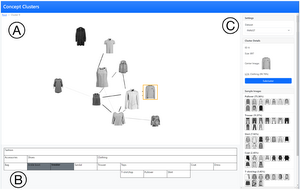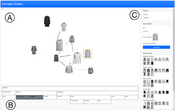Information
- Publication Type: Student Project
- Workgroup(s)/Project(s):
- Date: 2023
- Date (Start): March 2022
- Date (End): March 2023
- Matrikelnummer: 0925239
- First Supervisor: Manuela Waldner
Abstract
The Motivation for this work is to explore methods for visualizing high-dimensional datasets, with a specific focus on understanding the inner workings of Deep Neural Networks (DNNs). DNNs are a type of Artificial Neural Network (ANN) that consist of an input layer, an output layer, and multiple hidden layers. They are able to make predictions or decisions based on unseen observations, but the way that they arrive at these decisions can often be opaque, or difficult to interpret. By exploring the similarities of feature vectors in the latent space created by the network, it is possible to gain insight into how the network organizes and classifies observations with similar properties that are also interpretable to the human eye.The goal of this work is to develop a prototype that enables interactive exploration of data clusterings in high-dimensional feature spaces, instead of the traditional twodimensional visual representation.
Additional Files and Images
Weblinks
No further information available.BibTeX
@studentproject{wolf-2023-cc,
title = "Concept Clusters",
author = "Dominik Wolf",
year = "2023",
abstract = "The Motivation for this work is to explore methods for
visualizing high-dimensional datasets, with a specific focus
on understanding the inner workings of Deep Neural Networks
(DNNs). DNNs are a type of Artificial Neural Network (ANN)
that consist of an input layer, an output layer, and
multiple hidden layers. They are able to make predictions or
decisions based on unseen observations, but the way that
they arrive at these decisions can often be opaque, or
difficult to interpret. By exploring the similarities of
feature vectors in the latent space created by the network,
it is possible to gain insight into how the network
organizes and classifies observations with similar
properties that are also interpretable to the human eye.
The goal of this work is to develop a prototype that enables
interactive exploration of data clusterings in
high-dimensional feature spaces, instead of the traditional
twodimensional visual representation.",
month = mar,
URL = "https://www.cg.tuwien.ac.at/research/publications/2023/wolf-2023-cc/",
}

 report
report

